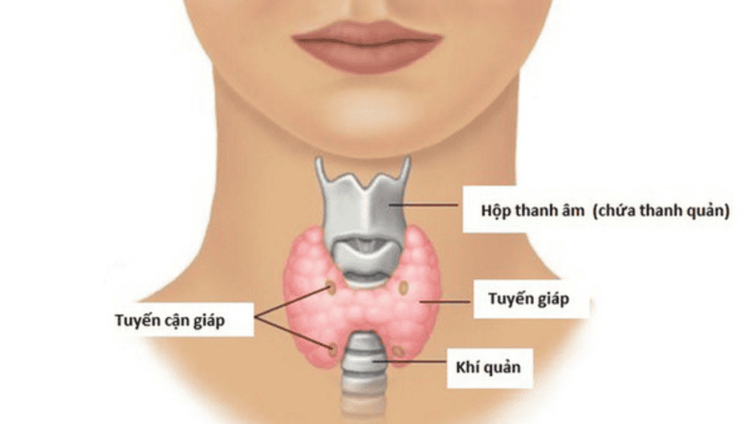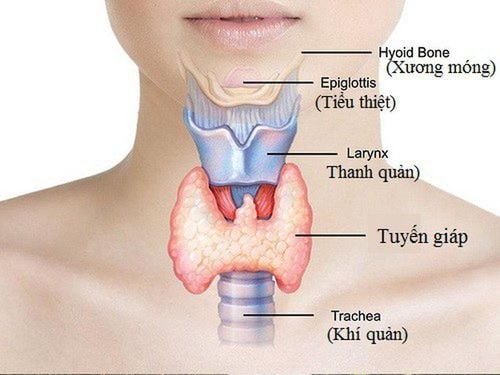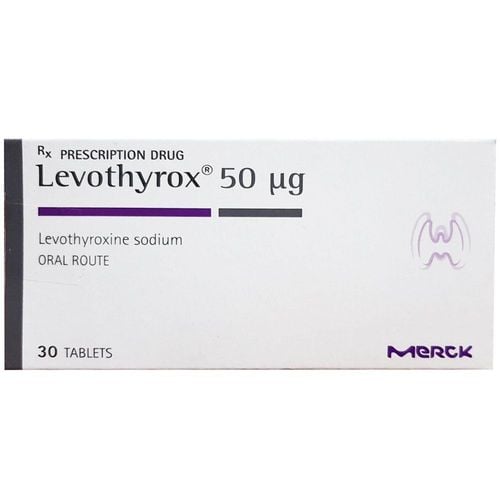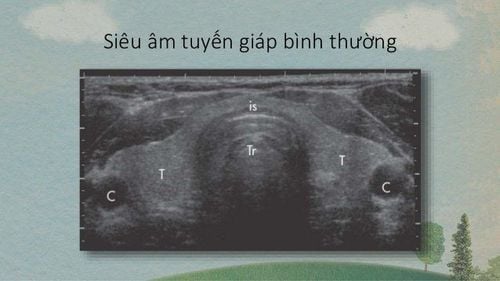This is an automatically translated article.
Hyperparathyroidism is a disease caused by an overactive parathyroid gland in the body, which causes high levels of calcium in the blood. Hyperparathyroidism, if not treated promptly, can lead to diseases such as: osteoporosis, high blood pressure, pancreatitis or stomach ulcers, kidney stones.1. What is hyperparathyroidism?
Hyperparathyroidism is a condition caused by too much parathyroid hormone in the blood. The glands are grain-sized, oval in shape. The parathyroid glands produce parathyroid hormone, which helps the body maintain the proper balance of calcium in the blood and tissues.
There are 2 types of hyperparathyroidism:
Primary hyperparathyroidism: Due to enlargement of one or more parathyroid glands, an excess of hormones leads to high blood calcium levels. Hyperparathyroidism causes a wide range of health problems. Secondary hyperparathyroidism: Complications of one or more conditions that cause low bone calcium levels. Common complications of hyperparathyroidism include:
Causes osteoporosis: The loss of calcium is the cause of osteoporosis, or weak, brittle bones that easily lead to fractures. Kidney stones: Excess calcium in the blood causes the deposition of calcium and other substances in the kidneys causing kidney stones. The disease causes pain when the kidney stone passes through the urinary tract. Cardiovascular disease: High calcium levels can cause several types of heart disease. Neonatal Hyperparathyroidism: Severe, untreated hyperparathyroidism in pregnant women can cause dangerously low calcium levels in the newborn.

Vị trí tuyến cận giáp
2. Causes and symptoms of hyperparathyroidism
Causes of hyperparathyroidism are:
Causes of primary hyperparathyroidism are: 2 or more parathyroid glands are overactive and produce too much parathyroid hormone; due to 1 tumor in one of the parathyroid glands; cancer in the parathyroid glands. Causes of secondary hyperparathyroidism: The patient's body does not have enough calcium; Vitamin D levels are extremely low, so the amount of calcium in the blood is not enough for the patient's body to absorb calcium. Symptoms of hyperparathyroidism include:
When symptoms of hyperparathyroidism occur, they are the result of damage or dysfunction in other organs or tissues due to high or excessive circulating blood calcium levels. less in bone.
Signs and symptoms include:
Fragile, fragile bones; Kidney stones Abdominal pain, frequent urination Frequent fatigue or weakness Depression, poor memory Bone and joint pain Nausea, vomiting or loss of appetite

Người bệnh bị đau nhức xương khớp
These symptoms can be caused by any of these disorders and a number of serious complications. Therefore, it is necessary to be diagnosed quickly and accurately to have an appropriate treatment regimen for hyperparathyroidism.
3. Diagnosis and treatment of hyperparathyroidism
3.1. Diagnosing Hyperparathyroidism
Methods for diagnosing hyperparathyroidism include:
Blood tests : If the results of a blood test show high blood calcium levels, your doctor may repeat the test. Repeat the test to confirm the results after not eating for a while. Your doctor can make a diagnosis of hyperparathyroidism if blood tests show elevated parathyroid hormone.
Bone density test: The most common test to measure bone density is the energy x-ray absorptiometry, or DXA scan. This method uses X-ray equipment to measure calcium and other bone minerals at a segment of bone.
Urinalysis: 24-hour urine can provide information about kidney function and how calcium is excreted in the urine, helping to assess the severity of hyperparathyroidism or diagnose a kidney disorder causing hyperparathyroidism.

Xét nghiệm nước tiểu giúp chẩn đoán bệnh cường tuyến cận giáp
Renal imaging: This method can diagnose hyperparathyroidism. Your doctor will take X-rays or other imaging tests of your abdomen to determine if there are kidney stones or other kidney abnormalities.
3.2. Treatment of Hyperparathyroidism
Treatment of hyperparathyroidism is usually based on the underlying cause. Specifically:
For secondary hyperparathyroidism: You will be asked to take vitamin D and calcium supplements. For primary hyperparathyroidism: You will need surgery to remove one or more of the overactive parathyroid glands. Surgery is the most common treatment for primary hyperparathyroidism. Surgery can be done through very small incisions and the patient is injected with a local anesthetic.
4. Limit the progression of hyperparathyroidism
The following lifestyle habits can help people with hyperparathyroidism limit the progression of hyperparathyroidism:
Tell your specialist if you have a family history of hyperparathyroidism thyroid or other endocrine neoplasms. If you feel dehydrated (exhausted) or cannot move due to injury or some other medical condition, this may affect the amount of calcium in your body. your body and develop symptoms of kidney stones, muscle spasms, facial convulsions, or numbness in the surrounding area after surgery for hyperparathyroidism. If you have just finished treatment for hyperparathyroidism, every day, drink a lot of water (at least 2 liters of water) to prevent the amount of calcium in the blood from increasing, because dehydration will reduce the amount of calcium in the patient's blood. increase. Get a routine checkup (every 6 months) if you have hyperparathyroidism but didn't have surgery; and regularly do tests to know the extent of the disease such as blood tests, urine tests, bone density tests, kidney function and calcium levels in your blood.

Kiểm tra định kỳ (6 tháng 1 lần) giúp phát hiện sớm bệnh lý
Vinmec International General Hospital is one of the hospitals that not only ensures professional quality with a team of leading medical doctors, modern equipment and technology, but also stands out for its examination and consultation services. comprehensive and professional medical consultation and treatment; civilized, polite, safe and sterile medical examination and treatment space. Customers who choose to perform the services here can be completely assured of the results. In addition, customers will be examined with a specialist to determine the risk of disease and have a scientific treatment direction.
Customers can directly go to Vinmec Health system nationwide to visit or contact the hotline here for support.
SEE MORE
Complications can be encountered if thyroid hormone deficiency Common diseases in the thyroid gland and treatment There are 10 signs, immediately think of thyroid disease













